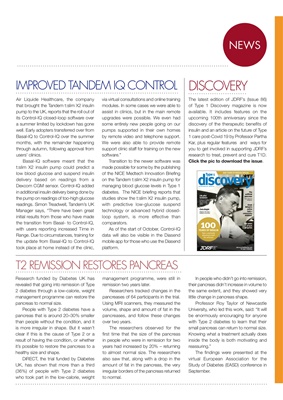
NEWS
The latest edition of JDRF's (Issue 86)
of Type 1 Discovery magazine is now
available. It includes features on the
upcoming 100th anniversary since the
discovery of the therapeutic benefits of
insulin and an article on the future of Type
1 care post-Covid 19 by Professor Partha
Kar, plus regular features and ways for
you to get involved in supporting JDRF's
research to treat, prevent and cure T1D.
Click the pic to download the issue.
DISCOVERY
IMPROVED TANDEM IQ CONTROL
T2 REMISSION RESTORES PANCREAS
Air Liquide Healthcare, the company
that brought the Tandem t:slim X2 insulin
pump to the UK, reports that the roll out of
its Control-IQ closed-loop software over
a summer limited by lockdown has gone
well. Early adopters transferred over from
Basal-IQ to Control-IQ over the summer
months, with the remainder happening
through autumn, following approval from
users' clinics.
Basal-IQ software meant that the
t:slim X2 insulin pump could predict a
low blood glucose and suspend insulin
delivery based on readings from a
Dexcom CGM sensor. Control-IQ added
in additional insulin delivery being done by
the pump on readings of too-high glucose
readings. Simon Treadwell, Tandem's UK
Manager says, "There have been great
initial results from those who have made
the transition from Basal- to Control-IQ,
with users reporting increased Time in
Range. Due to circumstances, training for
the update from Basal-IQ to Control-IQ
took place at home instead of the clinic,
via virtual consultations and online training
modules. In some cases we were able to
assist in clinics, but in the main remote
upgrades were possible. We even had
some entirely new people going on our
pumps supported in their own homes
by remote video and telephone support.
We were also able to provide remote
support clinic staff for training on the new
software."
Transition to the newer software was
made possible for some by the publishing
of the NICE Medtech Innovation Briefing
on the Tandem t:slim X2 insulin pump for
managing blood glucose levels in Type 1
diabetes. The NICE briefing reports that
studies show the t:slim X2 insulin pump,
with predictive low-glucose suspend
technology or advanced hybrid closedloop system, is more
effective than
comparators.
As of the start of October, Control-IQ
data will also be visible in the Diasend
mobile app for those who use the Diasend
platform.
Research funded by Diabetes UK has
revealed that going into remission of Type
2 diabetes through a low-calorie, weight
management programme can restore the
pancreas to normal size.
People with Type 2 diabetes have a
pancreas that is around 20-30% smaller
than people without the condition, and it
is more irregular in shape. But it wasn't
clear if this is the cause of Type 2 or a
result of having the condition, or whether
it's possible to restore the pancreas to a
healthy size and shape.
DiRECT, the trial funded by Diabetes
UK, has shown that more than a third
(36%) of people with Type 2 diabetes
who took part in the low-calorie, weight
management programme, were still in
remission two years later.
Researchers tracked changes in the
pancreases of 64 participants in the trial.
Using MRI scanners, they measured the
volume, shape and amount of fat in the
pancreases, and follow these changes
over two years.
The researchers observed for the
first time that the size of the pancreas
in people who were in remission for two
years had increased by 20% - returning
to almost normal size. The researchers
also saw that, along with a drop in the
amount of fat in the pancreas, the very
irregular borders of the pancreas returned
to normal.
In people who didn't go into remission,
their pancreas didn't increase in volume to
the same extent, and they showed very
little change in pancreas shape.
Professor Roy Taylor of Newcastle
University, who led this work, said: "It will
be enormously encouraging for anyone
with Type 2 diabetes to learn that their
small pancreas can return to normal size.
Knowing what a treatment actually does
inside the body is both motivating and
reassuring."
The findings were presented at the
virtual European Association for the
Study of Diabetes (EASD) conference in
September.